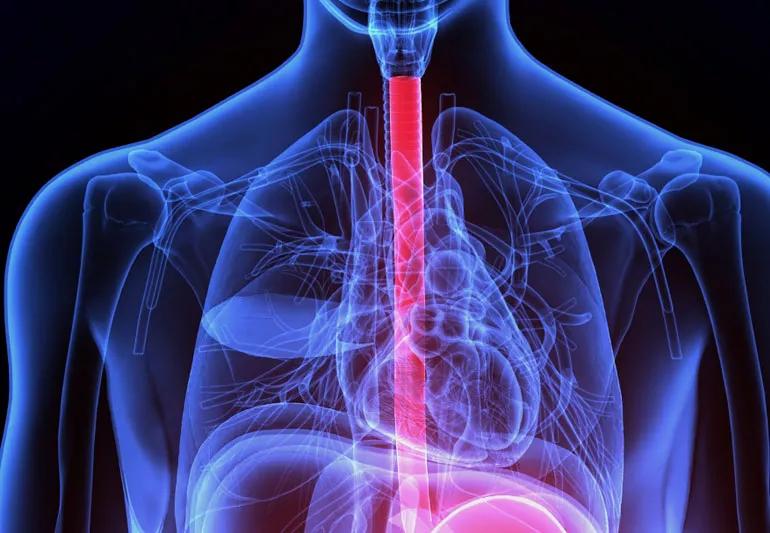Why the condition, also called jackhammer esophagus, is missed

Image content: This image is available to view online.
View image online (https://assets.clevelandclinic.org/transform/f82cd4ad-ebd1-4c3b-b91c-d0459b326353/jackhammerEsophagus-973723426-770x533-1_jpg)
illustration of the esophagus
You may never have heard of a rare condition called “nutcracker esophagus” or “jackhammer esophagus.”
Advertisement
Cleveland Clinic is a non-profit academic medical center. Advertising on our site helps support our mission. We do not endorse non-Cleveland Clinic products or services. Policy
Many doctors are unfamiliar with it, too. That’s why the frequently painful condition with the colorful name often goes undetected.
“Nutcracker esophagus” can trigger chest pain, difficulty swallowing and the feeling that food is getting stuck,” notes gastroenterologist Scott Gabbard, MD. “It’s often misdiagnosed as a heart attack or acid reflux.”
Nutcracker or jackhammer esophagus targets the smooth muscles that usually move food seamlessly from your throat down to your stomach. So does esophageal spasm.
“Think of these disorders as cousins,” says Dr. Gabbard. “Normally, when you swallow liquids or solids, there’s a nice, coordinated squeeze moving from the top, to the middle, to the bottom of the esophagus.”
But in jackhammer esophagus, the muscle contractions are too strong. And in esophageal spasm, the muscle contractions are too rapid.
Improvements in manometry, the muscle test used to diagnose both conditions, led to a new name for nutcracker esophagus.
Older, 2-D manometry tracings revealed a nutcracker pattern when the esophagus muscles squeeze hard enough to close the esophagus.
Newer, 3-D high-resolution manometry tracings instead reveal “a strong, repetitive pattern of contractions that look the pounding of a jackhammer all the way down the esophagus in some patients,” says Dr. Gabbard.
Advertisement
Both conditions can cause chest pain severe enough to send you to the emergency room — or no symptoms at all.
When patients present with chest pain, doctors first rule out heart disease, he says. Their next step is typically upper endoscopy or prescribing anti-reflux medicine to see if the problem is acid reflux.
If pain and swallowing difficulty persist, they often stop there and assume it’s esophageal spasm. “But manometry is the only way to diagnose these muscle disorders,” Dr. Gabbard notes.
Once jackhammer esophagus or esophageal spasm are diagnosed, treatment involves relaxing the esophagus muscles using:
1. Medication. Calcium channel blockers relax the smooth muscle both in the arteries and in the esophagus. “Taking a calcium channel blocker before eating helps about 75% of patients with swallowing,” says Dr. Gabbard. “But some can’t tolerate the blood pressure medicine.”
If pain persists, he will prescribe a tricyclic antidepressant, which targets the esophageal nerves.
2. Peppermint oil. For patients who don’t want to take medication or don’t respond to it, Dr. Gabbard recommends peppermint oil.
“About half of those who can’t tolerate blood pressure medicine respond to peppermint oil,” he says. “One study found that it helped esophageal spasm, so it should also help jackhammer esophagus.”
3. Botox®. When medications and peppermint oil don’t help, the next step is botulinum toxin injections. “90% of the time it can stop the jackhammer or spasms, but it only lasts about a year,” notes Dr. Gabbard.
4. POEM. In select cases, when patients who respond only to Botox want a permanent solution, he may recommend a new, minimally invasive procedure called Per Oral Endoscopy Myotomy (POEM).
A small incision is made in the esophagus muscle to stop contractions. “POEM is irreversible, so patients no longer have working muscle,” he points out. “But gravity helps them drain food from the esophagus.”
Jackhammer esophagus and esophageal spasm may resolve on their own or remain stable. “The good news is that they don’t turn into anything worrisome, like cancer,” he says.
“Any patient, from ages 8 to 108, can get these conditions,” says Dr. Gabbard. “But they are somewhat rare, affecting less than 1% of the population.”
Chronic use of opiates (to manage cancer pain, for example) can increase risk. And while some patients with acid reflux develop jackhammer esophagus or esophageal spasm, most do not.
If you have chest pain, it’s imperative to rule out a cardiac cause, Dr. Gabbard stresses.
Advertisement
“But if chest pain and swallowing do not improve after endoscopy, be proactive,” he says. “Tell your doctor what’s going on. Ask for manometry.”
Advertisement

Sign up for our Health Essentials emails for expert guidance on nutrition, fitness, sleep, skin care and more.
Learn more about our editorial process.
Advertisement
From heartburn and panic attacks to muscle spasms and heart attacks, lots of medical conditions can cause chest pain
If you have other cardiac symptoms, and antacids aren’t working, it’s time to call emergency services
Feelings of stress or anxiety can cause an increase in hormones and a tightening of the chest muscles, which can lead to chest pain
If your provider has ruled out a serious cause, you can treat chest pain at home with antacids, inhalers or anti-inflammatory medications
Don’t ignore chest pressure that lingers and can’t be explained
Not all chest discomfort is a symptom of a heart attack
Exerting yourself in cold temperatures increases your risk of a cardiac event
Strokes affect your brain, while heart attacks affect your heart — both can be life-threatening emergencies
Prioritize your health by managing stress, strengthening your social connections and getting quality sleep
Bolsters, blankets, pillows and blocks can offer extra support, stability and comfort
Allergies, postnasal drip, asthma or reflux could be to blame for a cough that won’t quit